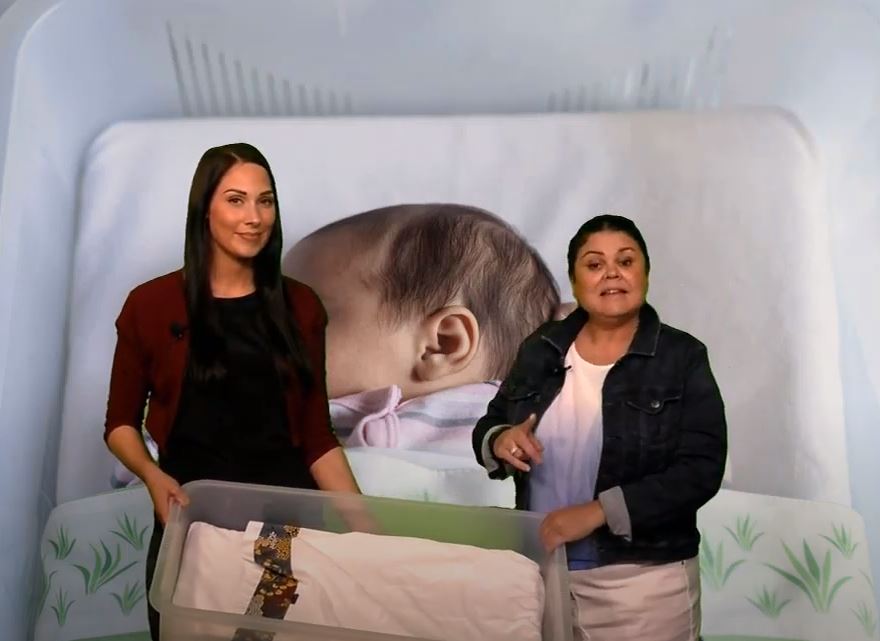
A culturally safe solution to support Aboriginal babies to sleep safely will be offered to First Nations families across SA to reduce the number of babies dying from Sudden Infant Death Syndrome (SIDS).
The Pepi-Pod program prioritises safe sleep education, while also providing a small bed to create a safe ‘pod’ or sleep space that can be placed in or next to the family bed.
Aboriginal babies die from Sudden Unexplained Death in Infancy (SUDI) and SIDS at a rate three-four times that of non-Aboriginal babies.
“This never has been and never will be okay,” say Professor Julian Grant and Dr Nina Sivertsen, an associate member of the Caring Futures Institute, who are leading the Safely Sleeping Aboriginal Babies in South Australia (Doing it Together) program.
The Flinders University-led program, in collaboration with the Aboriginal Health Council of SA, the Women and Children’s Health Network and SA Health, was conceived after Aboriginal cultural consultant, Ms Wilhelmine Lieberwirth, approached Child and Family Health Services staff to look for ‘culturally safe’ solutions to support Aboriginal babies to sleep safely.
“We wanted to see if the Pepi-Pod program was experienced as culturally safe and if First Nations families would even use it,” says Dr Sivertsen of the first small initial pilot trial in SA.
“Families told us that one of the best parts of the Pepi-Pod program is that ‘you don’t have to worry’ babies were in their ‘own little comfort zone’.
“Babies were ‘peaceful and safe’ and you could ‘see him’, ‘feel him’ ‘touch him’ and ‘hear him’, while baby slept safely in the pod.”
Flinders adjunct Professor Grant, now at Charles Sturt University in NSW, explains that many families including First Nations peoples sleep with their babies in the family bed.
“While bed sharing has many benefits, it is also associated with infant death and is not recommended by SA Health,” says chief investigator Professor Grant.
Sharon Watts, an Aboriginal researcher on the project, says that it is “really important for First Nations families to feel close to their babies all the time, especially when sleeping”.
While some participants thought the Pepi Pod itself looked like a ‘breadbox’, they found the sense of safety comforting and the education program a great way to share safe sleep knowledge with family, friends and community.
The first paper, ‘It looks like a breadbox’: a pilot study investigating implementation of the Pepi-Pod® program with Aboriginal families in metropolitan South Australia (2021) by J Grant, N Sivertsen, J Deverix and A Steeb has been published in Primary Health Care Research & Development (Cambridge University Press) DOI: 10.1017/S1463423621000293
The Pedi-Pod research team is now completing a larger Medical Research Future Fund project to deliver a safe sleep education module to about 235 health care professionals, as well as the safe sleep information and Pepi-Pod deliveries to up to 70 families to sleep their baby. https://sites.flinders.edu.au/ssabsa/
“We are now finding out together if the Pepi-Pod program is culturally safe and if it can be used in mainstream health services,” the researchers say.
The project is adapting and translating a culturally safe, alternative sleep space program (Pēpi-Pod®) that has been shown in two randomised control trials in New Zealand and rolled out across much of Queensland. It will be offered as an alternative to infant-adult bed sharing, to increase mothers’ and family knowledge of sleeping babies safely across SA.
The Safely Sleeping Aboriginal Babies project team comprised Chief Investigator Professor Julian Grant (Charles Sturt University, Flinders University) and co-investigators:
- Professor Nicola Spurrier (SA Chief Medical Officer)
- Dr Nina Sivertsen (Flinders University)
- Ms Janiene Deverix (WCHN-Manager Aboriginal Health Strategic Operations)
- Associate Professor Charlene Thornton (Flinders University)
- Ms Susan Dyer (WCHN-Advanced Nurse Consultant – Clinical Practice Development)
- Ms Maryanne Williams (Aboriginal Health Council of SA)
- Ms Alice Steeb (WCHN Nurse Consultant Strategic Projects)

